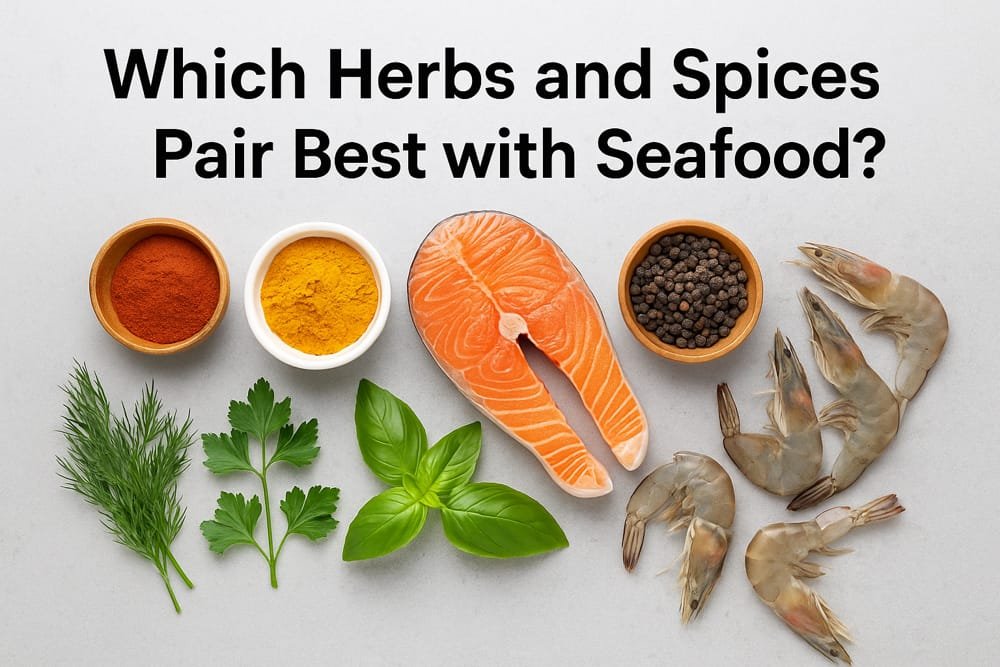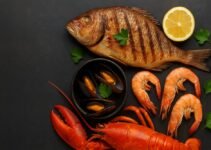Herbs and spices are critical in elevating the natural flavors of seafood. Without the right seasonings, even the freshest fish or shellfish can taste bland. Culinary experts consistently emphasize that matching the correct herbs and spices with seafood not only enhances taste but also creates a more balanced and memorable dining experience. This guide explores the exact herb and spice pairings that best complement different types of seafood, based on cooking methods and regional culinary traditions. By the end of this article, you will know exactly which seasonings to use for your next seafood dish, ensuring perfectly balanced flavors every time.
Contents
- 1 What Are the Most Popular Herbs Used to Season Seafood?
- 2 Which Spices Work Best to Add Bold Flavors to Seafood?
- 3 What Are the Best Herb and Spice Pairings for Specific Types of Seafood?
- 4 How Do Cooking Methods Influence Herb and Spice Selection for Seafood?
- 5 How Do Different Cuisines Influence Herb and Spice Pairings with Seafood?
- 6 Should You Use Fresh or Dried Herbs When Cooking Seafood?
- 7 What Are Common Mistakes to Avoid When Pairing Herbs and Spices with Seafood?
What Are the Most Popular Herbs Used to Season Seafood?
Fresh dill, parsley, and basil are the three most widely used herbs for seafood due to their complementary flavor profiles and culinary versatility.
How Does Fresh Dill Enhance the Taste of Fish and Shellfish?
Fresh dill enhances seafood by adding a bright, slightly tangy flavor that complements delicate fish and shellfish. It is most commonly used with salmon, trout, and shrimp. In Scandinavian cuisine, dill is essential for gravlax and pickled herring dishes. Adding 2 to 3 tablespoons of freshly chopped dill to a butter or lemon-based sauce instantly lifts the flavor without overpowering the seafood’s natural sweetness.
Why Is Parsley Considered a Versatile Herb for Seafood Dishes?
Parsley provides a fresh, mildly peppery taste that brightens seafood preparations. It is suitable for both raw garnishes and cooked recipes. Chefs often recommend flat-leaf (Italian) parsley for its stronger aroma. For grilled fish, a simple garnish of 1 tablespoon of chopped parsley with olive oil and lemon zest enhances both appearance and flavor. In Mediterranean cuisine, parsley is a core ingredient in sauces like chimichurri and gremolata, frequently served with grilled or baked fish.
What Makes Basil a Perfect Match for Mediterranean Seafood Recipes?
Basil adds a sweet, slightly anise-like flavor that pairs exceptionally well with tomato-based seafood dishes. In Mediterranean cooking, it is frequently combined with olive oil, garlic, and fresh tomatoes to create vibrant sauces for fish like sea bass and snapper. For the best flavor, add 5 to 6 fresh basil leaves at the end of cooking to preserve its aromatic oils. Basil is also a popular addition to seafood pastas and stews, including the famous Italian cioppino.
Which Spices Work Best to Add Bold Flavors to Seafood?
Smoked paprika, turmeric, and black pepper are the top three spices that introduce bold and distinctive flavors to seafood dishes without overpowering the natural taste of the fish or shellfish.
How Does Smoked Paprika Add Depth to Grilled Seafood?
Smoked paprika delivers a rich, smoky aroma that enhances grilled seafood with a deep, savory character. It is particularly effective when used on firm-textured fish like tuna, swordfish, and salmon. Applying 1 to 2 teaspoons of smoked paprika in a dry rub or marinade helps develop a flavorful crust during grilling. Spanish cuisine often uses smoked paprika, known as pimentón, to season grilled octopus and prawns, adding both color and complexity to the final dish.
Why Is Turmeric Commonly Used in Seafood Curries?
Turmeric imparts a warm, earthy flavor and vibrant golden color that defines many seafood curries. It also offers anti-inflammatory health benefits, making it a functional ingredient in many diets. In Indian and Southeast Asian cuisine, adding 1 teaspoon of turmeric powder to coconut milk-based sauces balances the richness of fatty fish like mackerel and catfish. Turmeric is also essential in spice blends such as garam masala and curry powder, which are frequently used in seafood stews and soups.
How Can Black Pepper Enhance the Flavor Profile of White Fish?
Black pepper provides sharp, pungent heat that sharpens the mild flavors of white fish varieties like cod, haddock, and tilapia. Freshly ground black pepper is preferred for its robust aroma and intensity. Chefs typically recommend seasoning fish with ¼ to ½ teaspoon of freshly cracked black pepper just before cooking to preserve its volatile oils. In French cuisine, black pepper is a key ingredient in classic sauces like beurre blanc, served over poached or pan-fried white fish.
What Are the Best Herb and Spice Pairings for Specific Types of Seafood?
Each type of seafood requires specific herbs and spices to optimize its unique flavor profile. Below are the ideal combinations for the four most popular seafood categories.
Which Herbs and Spices Complement Salmon Dishes?
Salmon pairs best with dill, lemon zest, and black pepper for a clean, refreshing flavor. For a bolder profile, chefs often use smoked paprika and garlic powder. A common seasoning ratio is 2 tablespoons of chopped dill, 1 teaspoon of lemon zest, and ½ teaspoon of black pepper per 500 grams of salmon. This combination works perfectly for both baking and grilling methods.
What Seasonings Bring Out the Best in Shrimp and Prawns?
Shrimp and prawns taste best when seasoned with garlic, cayenne pepper, and lime juice. These ingredients enhance their natural sweetness and add a hint of heat. For spicy shrimp skewers, marinate 500 grams of shrimp with 1 teaspoon of cayenne pepper, 2 minced garlic cloves, and 2 tablespoons of fresh lime juice for 20 minutes before grilling.
How Should You Season Scallops for Maximum Flavor?
Scallops require minimal seasoning to highlight their delicate, buttery texture. A combination of sea salt, white pepper, and a touch of fresh thyme is ideal. Sear scallops with ¼ teaspoon of sea salt and a pinch of white pepper per serving. Add 1 to 2 sprigs of fresh thyme to the pan during searing for a subtle herbal aroma.
What Are the Ideal Spice Blends for Grilled Lobster or Crab?
Grilled lobster and crab benefit from bold spice blends like Old Bay seasoning or Cajun spice mix. These blends contain a balanced mix of paprika, celery salt, black pepper, and cayenne pepper. Use 1 to 2 tablespoons of seasoning per kilogram of shellfish, applied generously before grilling. Serve with melted butter infused with 1 teaspoon of smoked paprika and crushed garlic for added depth.
How Do Cooking Methods Influence Herb and Spice Selection for Seafood?
Cooking methods directly impact the effectiveness of herbs and spices by altering their flavor intensity and aromatic release. Choosing the correct seasonings ensures the final dish maintains balance and flavor integrity.
Which Seasonings Are Best for Grilling Seafood?
Grilling seafood requires robust herbs and spices that can withstand high heat without losing their potency. Rosemary, thyme, and smoked paprika are ideal choices. For example, brushing swordfish steaks with olive oil and a mix of 1 teaspoon smoked paprika and 2 teaspoons chopped rosemary enhances smokiness and prevents drying out. Grilling also benefits from spice rubs containing garlic powder and black pepper, which form a flavorful crust.
What Herbs and Spices Work Well for Steaming and Poaching Fish?
Steaming and poaching favor delicate herbs like dill, parsley, and chives that release subtle aromas without overpowering the seafood. Adding 2 tablespoons of fresh herbs directly into the poaching liquid or steaming basket imparts gentle, fragrant notes to the fish. For added complexity, include a bay leaf and a few slices of lemon in the poaching liquid, enhancing both flavor and aroma.
How Should You Adjust Seasonings When Baking Seafood?
Baking seafood allows for both bold and subtle flavors, depending on the preparation style. When baking fillets, herbs like basil and oregano provide Mediterranean depth, while spice blends such as Cajun seasoning add bold character. For a 500-gram fillet, use 1 teaspoon dried oregano, ½ teaspoon garlic powder, and a squeeze of fresh lemon before baking. Adding herbs at the beginning ensures their flavors infuse throughout the cooking process.
How Do Different Cuisines Influence Herb and Spice Pairings with Seafood?
Each cuisine applies unique herb and spice combinations to highlight regional flavor profiles and cooking traditions. Understanding these influences allows you to replicate authentic seafood dishes at home.
What Are the Classic Mediterranean Seasonings for Seafood?
Mediterranean cuisine features olive oil, garlic, oregano, thyme, and basil in most seafood preparations. Dishes like grilled sea bass often include a drizzle of olive oil and a blend of 1 teaspoon dried oregano and fresh lemon juice. In Italian cooking, seafood pasta frequently incorporates basil and parsley to balance acidity and enhance natural sweetness.
How Is Seafood Seasoned in Asian Cuisine?
Asian seafood dishes rely heavily on ginger, garlic, soy sauce, and sesame oil for complex umami flavors. Chinese steamed fish typically uses 2 tablespoons of soy sauce, 1 tablespoon of rice wine, and finely chopped ginger to season whole fish. In Thai cuisine, seafood is often prepared with lemongrass, kaffir lime leaves, and bird’s eye chili for bright, spicy profiles.
What Spices Define Caribbean-Style Seafood Dishes?
Caribbean cuisine is known for its bold use of allspice, nutmeg, and Scotch bonnet peppers in seafood recipes. A typical jerk seasoning for grilled fish includes 1 teaspoon allspice, ½ teaspoon nutmeg, and finely chopped Scotch bonnet peppers. These spices create a sweet and spicy glaze that pairs perfectly with grilled lobster or snapper.
Should You Use Fresh or Dried Herbs When Cooking Seafood?
Fresh herbs are preferred for their vibrant flavor and aroma, especially in light seafood dishes, while dried herbs provide concentrated flavors ideal for longer cooking processes.
Use fresh herbs like dill, parsley, and chives in quick-cooking methods such as steaming or sautéing. For example, adding 2 tablespoons of fresh dill to steamed salmon enhances freshness without overpowering. Dried herbs such as oregano and thyme are better suited for baked or grilled seafood, where prolonged heat allows their flavors to fully develop.
What Are Common Mistakes to Avoid When Pairing Herbs and Spices with Seafood?
There are 3 critical mistakes to avoid when seasoning seafood: overusing strong spices, ignoring cooking methods, and misaligning flavors with cultural cuisines.
- Overpowering Delicate Flavors:
Using excessive amounts of strong spices like cumin or cayenne can mask the natural sweetness of seafood. Limit bold spices to no more than ½ teaspoon per 500 grams of delicate fish like cod or tilapia. - Ignoring Cooking Methods:
Applying the wrong seasonings for the cooking method leads to flavor loss. For example, fresh herbs burn easily on the grill, while dried herbs lack vibrancy in steamed dishes. - Mismatching Cultural Flavor Profiles:
Combining incompatible seasonings from different cuisines results in confusing flavors. Avoid pairing Asian-style soy-based marinades with Mediterranean herbs like oregano and thyme in the same dish.
Mastering the art of pairing herbs and spices with seafood not only enhances taste but also helps you explore global culinary traditions effortlessly. With the correct combinations, you can transform even the simplest seafood meal into a restaurant-quality experience. For perfectly seasoned dishes, always start with properly prepared ingredients by reviewing this guide on how to clean seafood properly.



